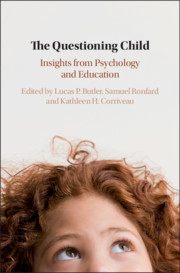Book contents
- The Questioning Child
- The Questioning Child
- Copyright page
- Dedication
- Contents
- Figures
- Tables
- Contributors
- 1 Questions about Questions
- 2 Questions in Development
- 3 The Point, the Shrug, and the Question of Clarification
- 4 The Quest for Comprehension and Learning
- 5 Children’s Question-Asking across Cultural Communities
- 6 The Development of Information-Requesting Gestures in Infancy and Their Role in Shaping Learning Outcomes
- 7 Developmental Changes in Question-Asking
- 8 Understanding Developmental and Individual Differences in the Process of Inquiry during the Preschool Years
- 9 “Why Are There Big Squares and Little Squares?”
- 10 Children’s Questions in Social and Cultural Perspective
- 11 Mothers’ Use of Questions and Children’s Learning and Language Development
- 12 Teaching and Learning by Questioning
- 13 Asking “Why?” and “What If?”
- 14 What Makes a Good Question? Towards an Epistemic Classification
- 15 The Questioning Child
- Index
- References
8 - Understanding Developmental and Individual Differences in the Process of Inquiry during the Preschool Years
Published online by Cambridge University Press: 10 January 2020
- The Questioning Child
- The Questioning Child
- Copyright page
- Dedication
- Contents
- Figures
- Tables
- Contributors
- 1 Questions about Questions
- 2 Questions in Development
- 3 The Point, the Shrug, and the Question of Clarification
- 4 The Quest for Comprehension and Learning
- 5 Children’s Question-Asking across Cultural Communities
- 6 The Development of Information-Requesting Gestures in Infancy and Their Role in Shaping Learning Outcomes
- 7 Developmental Changes in Question-Asking
- 8 Understanding Developmental and Individual Differences in the Process of Inquiry during the Preschool Years
- 9 “Why Are There Big Squares and Little Squares?”
- 10 Children’s Questions in Social and Cultural Perspective
- 11 Mothers’ Use of Questions and Children’s Learning and Language Development
- 12 Teaching and Learning by Questioning
- 13 Asking “Why?” and “What If?”
- 14 What Makes a Good Question? Towards an Epistemic Classification
- 15 The Questioning Child
- Index
- References
Summary
This chapter focuses on breaking down the process of using questions to gather information from others (i.e., inquiry) into its subcomponent parts to better understand the circumstances under which preschool-aged children can and will ask questions to gather information from others. We see the process of inquiry as involving at least four steps: determining when to engage in inquiry, deciding what to ask, selecting whom to question, and evaluating the information gathered to decide if inquiry should conclude or continue. In this chapter, we will briefly overview what we know about children’s ability to succeed at each of these steps during the preschool years, followed by a discussion of possible reasons for individual differences. The chapter concludes with implications for future research, including the importance of reflecting on the cost–benefit analysis children may undertake when determining whether or not to engage in each step of inquiry.
- Type
- Chapter
- Information
- The Questioning ChildInsights from Psychology and Education, pp. 144 - 163Publisher: Cambridge University PressPrint publication year: 2020
References
- 3
- Cited by

